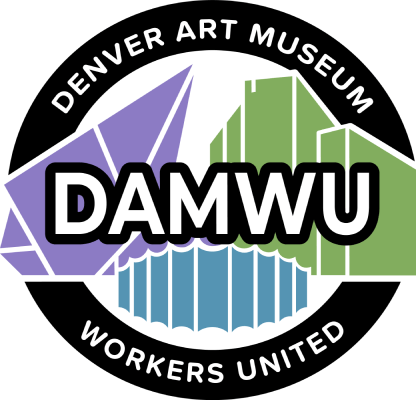What is a union and why do we need one at the Denver Art Museum?
A union is an organization formed by workers who come together and use their collective strength to have a voice in the workplace. Through their union, workers can negotiate from a position of strength with employers over wages, benefits, workplace health and safety, job training and other work-related issues. With a union, management must bargain in good faith over the conditions of our employment. Unions also serve an important role in holding management accountable for treating workers with respect.
Is it legal to unionize?
According to the National Labor Relations Act, we have a legally protected right to form our union. It is illegal for an employer to retaliate, intimidate or engage in any type of surveillance. They also cannot interrogate employees about their support for their union. No employer handbook or contract can take away that right.
It is also illegal for an employer to make any changes to the terms and conditions of current working conditions in retaliation for forming a union. The truth is that without a union, management could take away that flexibility at any time, e Securing a union contract with flexible scheduling language makes it a policy we have the power to monitor and enforce.
However, our best protection comes from standing together with a majority of our co-workers and forming our union.
I don’t think we need a third party/outsiders coming between the Denver Art Museum staff and management and telling us what to do.
We are our union. We vote to form our union and we will decide what to negotiate for in our contract. We will elect our own local union officers and decide how our union is run together.
We are backed by the largest movement of cultural workers, Cultural Workers United. By joining AFSCME, we also join over a million public service workers who will support us, along with resources like experienced negotiators, attorneys, researchers, and organizers.
I have a good relationship with my supervisor...
That’s great! Many of us do have good relationships with our supervisors, but this is not about them. This is about us, the workers, having a voice. Supervisors change all the time and are limited in what they can do for employees. When we form our union, policies will be clearer and more consistent, which will make our supervisors’ job more defined and our relationship even better.
Management is finally listening and says they are going to fix things. I think we should give them a chance.
It is great that management is finally hearing us, and if they are sincere about making changes, it should not be an issue to sit down with us as a union, negotiate improvements and put them into a contract. No working conditions, pay, or benefits are guaranteed until it is in the union contract.
Our union will help create policies and initiatives created by and for employees. We are the experts of what we need and should help determine the policies that impact us most.
Will we have to pay union dues? I don’t know if I can afford to.
No one will pay dues until we have successfully negotiated our contract and a majority of us have voted yes to approving it. Who would vote for a contract that is not worth their dues?
The local affiliation in Denver will be with AFSCME Council 18 and the 2024 dues rate for those who get paychecks every other week (26 pay periods per year) is -
Full time (above 30 hours/week) - $43.50 (roughly $22 per paycheck)
Part time (30 hours or less/week) - $32.55 (roughly $16.3 per paycheck)
Lower part time (12 hours or less/week) - $22.05 (roughly $11 per paycheck)
Where do the dues go?
Dues are used to build and grow the union such as negotiating union contracts, legal fees, representation, and organizing new workers. When more and more workers in an industry are organized, it helps raise the standards via contract negotiations to a higher level.
